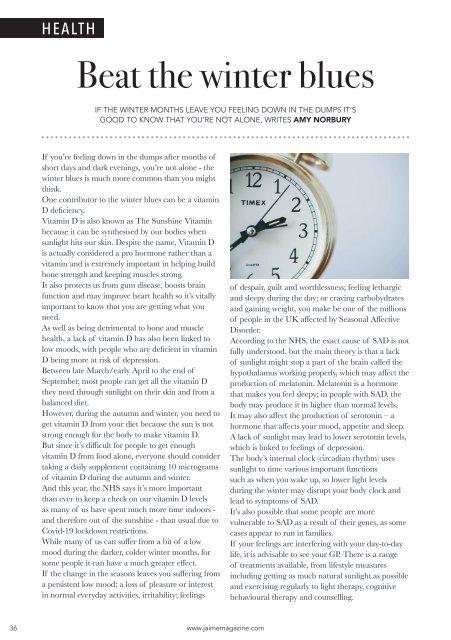J'AIME February 2021
Your local luxury lifestyle magazine
Your local luxury lifestyle magazine
You also want an ePaper? Increase the reach of your titles
YUMPU automatically turns print PDFs into web optimized ePapers that Google loves.
H E A LT H<br />
Beat the winter blues<br />
IF THE WINTER MONTHS LEAVE YOU FEELING DOWN IN THE DUMPS IT’S<br />
GOOD TO KNOW THAT YOU’RE NOT ALONE, WRITES AMY NORBURY<br />
If you’re feeling down in the dumps after months of<br />
short days and dark evenings, you’re not alone - the<br />
winter blues is much more common than you might<br />
think.<br />
One contributor to the winter blues can be a vitamin<br />
D deficiency.<br />
Vitamin D is also known as The Sunshine Vitamin<br />
because it can be synthesised by our bodies when<br />
sunlight hits our skin. Despite the name, Vitamin D<br />
is actually considered a pro hormone rather than a<br />
vitamin and is extremely important in helping build<br />
bone strength and keeping muscles strong.<br />
It also protects us from gum disease, boosts brain<br />
function and may improve heart health so it’s vitally<br />
important to know that you are getting what you<br />
need.<br />
As well as being detrimental to bone and muscle<br />
health, a lack of vitamin D has also been linked to<br />
low moods, with people who are deficient in vitamin<br />
D being more at risk of depression.<br />
Between late March/early April to the end of<br />
September, most people can get all the vitamin D<br />
they need through sunlight on their skin and from a<br />
balanced diet.<br />
However, during the autumn and winter, you need to<br />
get vitamin D from your diet because the sun is not<br />
strong enough for the body to make vitamin D.<br />
But since it’s difficult for people to get enough<br />
vitamin D from food alone, everyone should consider<br />
taking a daily supplement containing 10 micrograms<br />
of vitamin D during the autumn and winter.<br />
And this year, the NHS says it’s more important<br />
than ever to keep a check on our vitamin D levels<br />
as many of us have spent much more time indoors -<br />
and therefore out of the sunshine - than usual due to<br />
Covid-19 lockdown restrictions.<br />
While many of us can suffer from a bit of a low<br />
mood during the darker, colder winter months, for<br />
some people it can have a much greater effect.<br />
If the change in the seasons leaves you suffering from<br />
a persistent low mood; a loss of pleasure or interest<br />
in normal everyday activities, irritability; feelings<br />
of despair, guilt and worthlessness; feeling lethargic<br />
and sleepy during the day; or craving carbohydrates<br />
and gaining weight, you make be one of the millions<br />
of people in the UK affected by Seasonal Affective<br />
Disorder.<br />
According to the NHS, the exact cause of SAD is not<br />
fully understood, but the main theory is that a lack<br />
of sunlight might stop a part of the brain called the<br />
hypothalamus working properly, which may affect the<br />
production of melatonin. Melatonin is a hormone<br />
that makes you feel sleepy; in people with SAD, the<br />
body may produce it in higher than normal levels.<br />
It may also affect the production of serotonin – a<br />
hormone that affects your mood, appetite and sleep.<br />
A lack of sunlight may lead to lower serotonin levels,<br />
which is linked to feelings of depression.<br />
The body’s internal clock (circadian rhythm) uses<br />
sunlight to time various important functions<br />
such as when you wake up, so lower light levels<br />
during the winter may disrupt your body clock and<br />
lead to symptoms of SAD.<br />
It’s also possible that some people are more<br />
vulnerable to SAD as a result of their genes, as some<br />
cases appear to run in families.<br />
If your feelings are interfering with your day-to-day<br />
life, it is advisable to see your GP. There is a range<br />
of treatments available, from lifestyle measures<br />
including getting as much natural sunlight as possible<br />
and exercising regularly to light therapy, cognitive<br />
behavioural therapy and counselling.<br />
36 www.jaimemagazine.com

















